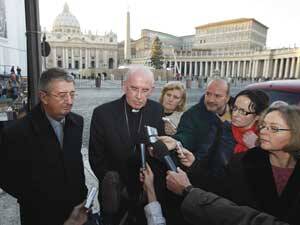Archbishop Diarmuid Martin of Dublin called on his episcopal colleagues to take responsibility for the Irish Catholic Church’s failures in dealing with child sexual abuse by priests. “Without accountability for the past there will be no healing and no trust for the future,” Archbishop Martin told reporters on March 20 following Mass at St. Mary’s Pro-Cathedral in Dublin after Pope Benedict XVI’s pastoral letter to Irish Catholics on the abuse crisis was released.
Just a few days later, on March 24, the Vatican announced that the pope had accepted the resignation offered on March 9 by Bishop John Magee of Cloyne. Magee, 73, had served as personal secretary to three popes. He was accused in a 2009 investigation of mishandling reports of sexual abuse in his diocese. Four other Irish bishops had offered their resignations to the pope in December because of their mishandling of sexual abuse of children by clerics. The pope has accepted only one of these resignations.
Cardinal Sean Brady of Armagh, Northern Ireland, has been under pressure to resign since he admitted on March 14 that he had been aware of allegations of abuse against a priest as early as 1975 and did not report them to police. Cardinal Brady has apologized, but he has resisted calls for his resignation.
Archbishop Martin described the pope’s letter as “part of a strategy of renewal of the church.” Many people “felt it was much stronger than expected,” he said. Asked why the pope did not make any reference to a Vatican role in the crisis in Ireland, Archbishop Martin said the responsibility “very much” fell on the Irish church. “The Vatican had produced the norms of canon law and they weren’t respected in the management of these cases,” he said.
The pope’s letter was read in full during Masses on March 20 and 21 in parishes across Ireland. Copies were snapped up quickly by parishioners.
During his homily on March 20, Archbishop Martin said: “The church tragically failed many of its children: it failed through abuse; it failed through not preventing abuse; it failed through covering up abuse.” He said: “Child protection measures need to be constantly updated; more participation of lay men and women is needed to avoid a false culture of clericalism. We need to develop a fresh idea of what childhood means; we need to develop a strong horror of what childhood-lost means.”
“We must face the truth of the past,” the archbishop said, “repent it; make good the damage done. And yet we must move forward day by day along the painful path of renewal, knowing that it is only when our human misery encounters face-to-face the liberating mercy of God that our church will be truly restored and enriched.”
Reaction from abuse victims to the papal letter was mixed. John Kelly of the Irish Survivors of Child Abuse said the letter represented a long-overdue apology from the pope. “We are fed up being victims and don’t want to remain victims,” Kelly said. “This letter is a possible step to closure, and we owe it to ourselves to study it and to give it a measured response.”
But Maeve Lewis, the executive director of the victims group One in Four, said she was deeply disappointed by the letter “for passing up a glorious opportunity to address the core issue in the clerical sexual abuse scandal: the deliberate policy of the Catholic Church at the highest levels to protect sex offenders.”
She said, “While we welcome the pope’s direction that the church leadership cooperate with the civil authorities in relation to sexual abuse...we feel the letter falls far short of addressing the concerns of the victims.”








